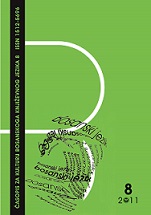Particip prezenta kao hibridna gramatička kategorija u njemačkome i ekvivalenti u bosanskom jeziku
THE PRESENT PARTICIPLE AS A HYBRID GRAMMATICAL CATEGORY IN GERMAN AND ITS EQUIVALENTS IN BOSNIAN
Author(s): Ismail Palić, Meliha HrustićSubject(s): Language and Literature Studies
Published by: Filozofski fakultet Univerziteta u Tuzli
Keywords: participle I; participle II; adjective; verb; present verbal adverb; adjectivization; attributive use; predicative use; adverbial use; equivalence; equivalent
Summary/Abstract: Present participle in the German language belongs to a category which some linguists regard as a verbal and others as an adjectival form. The fact is that this form has lost some of its ancient characteristics during its development, so that we can speak about a hybrid category between the verb and the adjective. Syntactically, the present participle occurs in the position which is typical for adjectives – the attributive position. On the other hand, the other position that is characteristic for adjectives in German linguistics – the predicative position, is blocked for the present participle. It is believed that only lexicalised present participle can occur in predicative position. Present participle occurs also in adverbial position in the German language. As for the active present participle in Bosnian, it has been affected by many changes. As a result, it lost its former syntactic and semantic functions, so that we can only speak about linguistic units which took over its particular functions and meanings in contemporary Bosnian. The active present participle belongs to the verbs but behaves as a hybrid category between verbs and adverbs. In modern Bosnian it can only be used in the adverbial function. However, no specific subcategory of words was formed to take over the adjectival function of the active present participle in Bosnian. For that purpose Bosnian uses mainly deverbal adjectives, among which those derived from the active present participle have a special place. Deverbal adjectives (those derived by adding different suffixes or by the categorial change), with or without change of the basic meaning of the verb, often prevent the adjectivization of the active present participle. Finally, the relative (attributive) clause is used as the semantic equivalent of the adjectival function of the participle with the unchanged basic meaning of the corresponding verb. The relative clause is the only appropriate semantic equivalent when the participle construction has a complement or adjunct as its constituent. On the other hand, if a participle underwent a change of the basic meaning of the verb, the relative clause must be semantically modified in an appropriate way in order to be an equivalent to the corresponding present participle. Further, the analysis has shown that the complete equivalence exists only in the adverbial use of the present participle. If this form is used in predicative position in German, its equivalents in Bosnian are either adjectives or, seldom, present participle. It is clear in both languages, that this form shows a strong tendency for adjectivization which brings us to the category situated somewhere between the verb and the adjective.
Journal: Bosanski jezik
- Issue Year: 2011
- Issue No: 08
- Page Range: 9-30
- Page Count: 22
- Language: Bosnian

